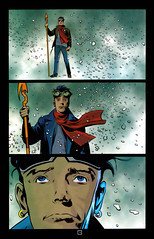Towards the end of his life, my father chose to end communication with me - long story short, I needed to take adult responsibility for my life; he didn't quite understand. When he passed three years ago, we were moving towards detente...but relations were still frosty. Plus, since my father's birthday - and Father's Day - both occur in the same month, it's been a little tough for me emotionally. It's only been in the aftermath of his passing that I've learned to grieve in my own way.

Basically, by reading and experiencing pieces which strike at the heart of relationships between fathers and children. For example, I'll be rereading issues of James Robinson's Starman - most notably the Sins of the Father and Sons of the Father trades. I've gushed over this series before, but my annual rereading of these two trades (on Father's Day) really demonstrates the care and craft that Robinson put into this week. Seeing the beginning - and ending - of Jack Knight's arc helps us realize that, throughout the series (which I'll obviously be sampling in between) shows us two men coming to grips with their relationship...and that although they begin as far apart as possible, they are much, much closer in thought, in personality, in spirit, than they are willing to admit.

But one of the more insightful - yet heartbreaking - explorations of the relationships between father and child is Paul Cornell's episode "Father's Day" in series one of Doctor Who. It's a simple enough premise - the Doctor's companion wants to go back in time to get a glimpse of her father, she changes history, and large killer time birds attack people - but within it is nuance. Much of it.
It's about a daughter realizing that the mythology about her father...isn't all true. That sometimes, a father can be a father even when he isn't "there". It's about the inevitability of certain events, and about the responsibilities that come with adulthood. It's about seeing the past as it was, unvarnished, and accepting it. Even though, at the end, history is slightly changed for the better, what we learn (or at least, what I learn) is that the first stage of growing up...is that realizing your parents are human.

No comments:
Post a Comment